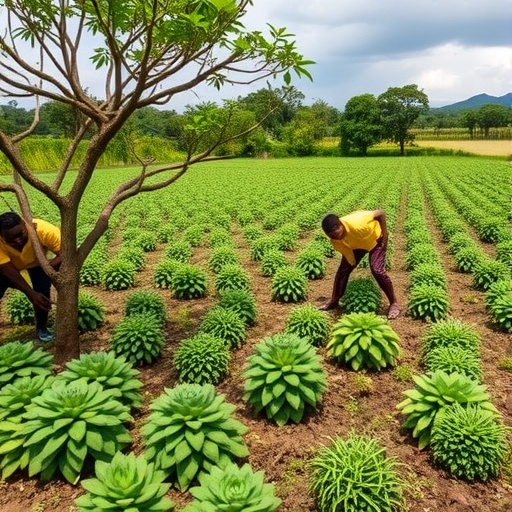Climate change remains one of the most pressing global challenges of our time, with far-reaching implications for natural ecosystems, agricultural systems, and the livelihoods of millions of people. In Cameroon, a nation rich in biodiversity and agricultural potential, the impacts of climate change are being felt acutely. The nation’s signature crops, cocoa and coffee, are not just economic staples but also integral to the cultural fabric of the local communities. In an important new study, climate change mitigation and adaptation strategies centered around cocoa and coffee-based agroforestry systems offer promising pathways towards enhancing resilience in the face of climatic shifts.
Agroforestry systems, which integrate trees and shrubs with crops and livestock, present a viable solution to combat climate change while simultaneously boosting agricultural productivity. These systems, particularly those involving cocoa and coffee, can improve soil health, enhance biodiversity, and create microclimates that may buffer extreme weather events. As global temperatures rise and rainfall patterns become increasingly erratic, the multifunctionality of agroforestry can act as a crucial line of defense for farmers in Cameroon.
Historically, cocoa and coffee have been grown in mono-culture systems, which, while economically advantageous in the short term, leave the landscape vulnerable to pests, diseases, and climate extremes. The shift towards agroforestry not only improves ecosystem services but also helps sequester carbon dioxide from the atmosphere, playing an essential role in global climate change mitigation efforts. Cocoa and coffee agroforestry settings can sequester significant amounts of carbon, contributing to offsetting greenhouse gas emissions, a key strategy in combating global warming.
Moreover, the adoption of agroforestry practices can enhance food security for smallholder farmers in Cameroon. By diversifying their operations and integrating additional crops and livestock, farmers can create more sustainable income streams while reducing the risk of total crop failure due to climate variations. This diversification is particularly crucial given the unpredictability of climate patterns, which can render traditional farming practices obsolete.
Research has shown that agroforestry systems not only promote a healthier and more resilient agricultural landscape but also provide essential habitats for wildlife, thereby contributing to biodiversity conservation. In a world where agricultural expansion often comes at the cost of natural habitats, cocoa and coffee agroforestry can promote symbiotic relationships between agriculture and nature. By fostering biodiversity, these systems can increase ecosystem resilience, aiding in the adaptation process to climate change.
The financial benefits of transitioning to cocoa and coffee-based agroforestry are profound. In many cases, farmers who adopt these practices can experience improved yields and increased revenue. Moreover, agroforestry practices often require lower inputs of chemical fertilizers and pesticides. This not only reduces costs for farmers but also lessens the environmental impact of agriculture, promoting a healthier environment for future generations.
In Cameroon, the integration of local knowledge and practices is vital in the successful implementation of agroforestry systems. Collaborating with indigenous communities ensures that the agroforestry practices adopted are both culturally relevant and ecologically sound. With the support of NGOs and governmental initiatives, local farmers can receive education and resources to shift towards these sustainable practices effectively.
In addition to economic and environmental resilience, agroforestry systems can also enhance social benefits. By promoting cooperatives and community-based management of resources, cocoa and coffee agroforestry can empower marginalized communities, fostering social cohesion and resilience in the face of climate change challenges. Empowering local communities not only facilitates the exchange of knowledge surrounding these innovative agricultural practices but also enhances social networks and community investment in sustainable agriculture.
Furthermore, the role of policy in supporting agroforestry as a response to climate change cannot be understated. Advocacy for governmental support, subsidies, and incentives for farmers transitioning to agroforestry is vital. By creating a favorable policy environment, governments can facilitate the adoption of these systems, helping both farmers and communities as they face the ongoing threats posed by climate change.
Researchers must also focus on monitoring and documenting the impacts of cocoa and coffee agroforestry systems on carbon sequestration, biodiversity improvement, and socio-economic benefits to validate their effectiveness. Rigorous scientific assessments can provide the empirical evidence necessary to suggest agroforestry as a primary strategy for those seeking to mitigate and adapt to the effects of climate change.
Technologies, such as remote sensing and geographical information systems (GIS), can play a crucial role in assessing the needs of various agroforestry systems across different regions of Cameroon. By utilizing these advanced techniques, researchers and policymakers can better understand the geographical and climatic constraints that farmers face and tailor agroforestry practices to suit local conditions.
In conclusion, the incorporation of cocoa and coffee-based agroforestry systems in Cameroon represents a transformative approach in addressing climate change challenges. By marrying economic and ecological principles, these systems not only enhance agricultural productivity but also promote sustainability and resilience among vulnerable farming communities. As the global climate crisis intensifies, the insights garnered from Cameroon’s agroforestry practices can serve as invaluable blueprints for other nations facing similar challenges, demonstrating that with innovation and collaborative efforts, a more sustainable future is within reach.
Subject of Research: Climate change mitigation and adaptation in Cameroon through cocoa and coffee-based agroforestry systems.
Article Title: Climate change mitigation and adaptation in Cameroon through cocoa and coffee-based agroforestry systems.
Article References:
Awazi, N.P. Climate change mitigation and adaptation in Cameroon through cocoa and coffee-based agroforestry systems. Discov. For. 1, 8 (2025). https://doi.org/10.1007/s44415-025-00008-1
Image Credits: AI Generated
DOI: 10.1007/s44415-025-00008-1
Keywords: Climate change, Cameroon, cocoa, coffee, agroforestry, mitigation, adaptation, biodiversity, sustainability, community engagement.




